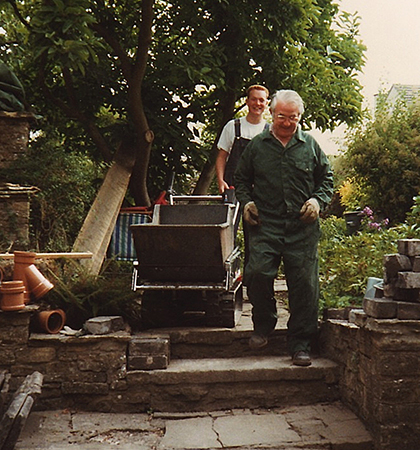MICHAEL Kilgarriff was the youngest of eight and the only sibling still at the homeplace in Ardcull, Ballaghaderreen in 1944.
He got his chance to join his three sisters and two brothers working in England when his eldest brother returned home to take on the family farm and travelling shop for their parents.
His three sisters were nurses and the two brothers were construction workers during the War and in the reconstruction years.
Mike longed to be in the open air
Only one of the family, Martin, a garda in Dublin, had got work in Ireland. Michael joined the two sisters nursing in Birmingham in 1945, and Jock Orr, his brother-in-law and a Scot, helped him find a job in a factory in Hockley.
Mike told us he was well accepted and his English workmates were kind, but he longed to be 'out in the open air'. A tip from his brother, Pat, got him a labourer's job on a road construction site near Lichfield.
Mike relates how he learned to drive machines on site by trial-and-error, when the regular drivers were taking a break; apparently he showed an aptitude for it and that was it, from then on the sites got bigger and so did the machines he got his hands on.
He spent years cutting out roads, levelling coal tips, making school playing fields and the like, roaming the East Midlands and living in 'digs' with his fellow Irish construction workers.
Sometimes he would drive trucks and deliver and collect hired scrapers on low-loaders. At other times he would maintain machines, back in the yards.
He could never understand why I, his nephew, was so useless at backing a trailer.
In the middling years he adopted a comfortable caravan lifestyle, parking up on site to cut out the 'crack of dawn' travelling to work.
Latterly, he bought a house in Chesterfield, his pride and joy. He made good friends with locals in the town and renewed contacts with Irish constructional workmates he had met on sites along the years or when attending mass at his local church, The Holy Family on Derby Road.
Michael never married.
To us, the children of his brothers and sisters, he was 'Uncle Mike', loved for his landlady stories and others, and for giving us a spin in his car - him being the only one in the whole of our greater family who had one.
People would ask: "Where do I get an Irish uncle? He’s amazing."
 Uncle Mike working with his great nephew Dominic
Uncle Mike working with his great nephew DominicIn retirement, he drove a brother, two sisters and a brother-in-law on annual trips exploring the parts of Ireland they had never seen.
He also drove them 'round the bend' with his impatience and frequently changed arrangements.
This, they joked, was due to his being the youngest, spoilt at home and a bachelor who had lived out of a suitcase between jobs for much of his working life.
Retirement gave Mike a new lease of life. My sister had married a farmer in the Cotswolds and Mike made regular trips to visit and help on the farm.
Here he wandered with their dogs, chatted to farmers and minded the sheep while my sister and her husband took a break.
Of equal delight to him was construction work on my site, a vast, ancient Cotswold house with outbuildings, a restoration always in progress.
It was home to me and my wife, our growing family of five, my widowed mother (Mike's sister) and a gang of technicians and designers who worked in our business.
Within hours of a visit, Mike would be in his old overalls with barrow, shovel and lump-hammer, an inveterate workhorse and a great tease.
Everyone: family, friends and staff, knew him as Uncle Mike. My staff would ask: "Where do I get an Irish uncle? He’s amazing."
Mike is still 'with us' in a sense, although he can no longer speak or act for himself. He suffers from Alzheimer's disease and is now living safely in a care home midway between us and our Birmingham-Irish cousins.
None of us saw the dementia coming, we expected crippled knees and hips as a result of his profession. We had all joked earlier that we would adapt the Honda powered barrow, seen with him in the photo above, to make him a superior caterpillar-tracked wheelchair when that time came.
Luckily, we collected Mike’s stories and photos when he had a full memory. We can usually still get a reaction from him by using the memory flipbook I prepared for him with big, significant photos and simple captions.
What he does recall, however, is being freezing cold, sitting up on a Drott in the winter, with no cab.
And his happiest memory? Charlie, the family farm-horse in the Ardcull of his youth on the Mayo-Roscommon border.

